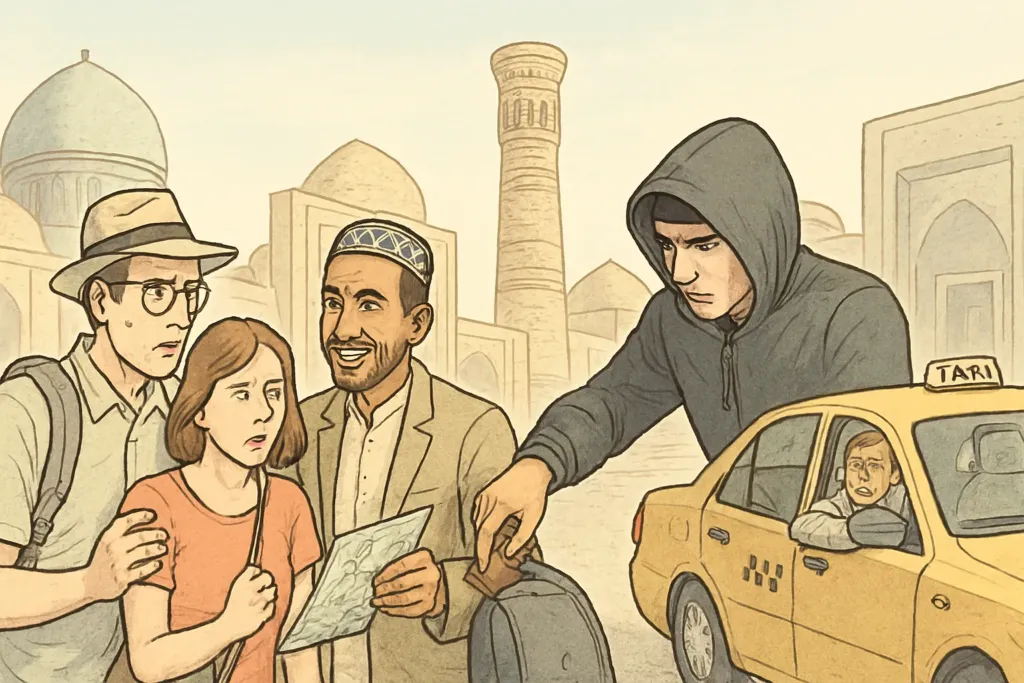Most common types of crime
Pickpocketing around monuments, markets and on public transport is the primary risk. In tourist zones you may face price gouging, aggressive upselling and product switches. Unlicensed guides can take deposits and disappear or deliver poor quality tours at inflated rates. Taxi issues include no meter rides, circuitous routes and extra luggage fees. Street currency exchange entails fake notes or shortchanging. Card skimming is uncommon but possible at isolated ATMs, and small restaurant tricks like undisclosed service fees do occur.
What to watch out for
Crowds and choke points at entrances where attention drops. Guides reluctant to show licenses or contracts. Unmarked taxis without meters, especially late at night near stations. Too good to be true exchange rates and unofficial money changers. High pressure sales in workshops where final prices are vague. Withdrawing cash alone in secluded spots after dark.
Prevention and best practices
Carry valuables under clothing, keep backpacks in front and split cash across pockets. Hire licensed guides recommended by your hotel or the official visitor center, confirm itinerary and price in advance and check ID. In taxis ask for the meter or agree a fixed fare and note the vehicle number. Exchange money at banks or official bureaus and keep receipts. Use ATMs inside banks or malls, shield the keypad. In cafes clarify whether service and taxes are included and request a menu with prices. Keep your passport in a hotel safe and carry a copy and phone photos. Hold travel insurance and your assistance contacts. Trust your instincts and politely decline pushy offers.
Where to seek help
Tourist police patrol major sights and the old town and can mediate disputes. Call 102 to file a police report. Medical assistance is at 103. Ask your hotel to help coordinate, translate and document the incident. For lost passports contact your consulate, and block bank cards immediately through your bank. For insurance claims keep receipts, reports and photos.
Statistics and context
Serious violent crime against visitors is rare in Bukhara, with safety enhanced by cameras, patrols and a dedicated tourist police. Minor incidents like bag theft or disputed prices remain possible where crowds and quick transactions meet. In high season, prebook services and allow time to verify terms calmly.
How to stay ahead of risks
Plan routes with buffer time to review prices and conditions. Use offline maps, share your plans, avoid visible high value items and keep phones secured with straps and remote lock. Put agreements in writing via messaging or paper to avoid misunderstandings. In disputes stay calm and seek assistance from tourist police.
Possible consequences and next steps
The most likely outcomes are financial loss, document issues and a dented travel mood. Quick reporting to police and your hotel, blocking cards and gathering evidence meaningfully increase recovery chances. Afterward, adjust habits, reduce exposure and continue your trip with upgraded precautions.
- History, discovery and scientific significance of the McMurdo Dry Valleys
- Treasure in the Cape Cod fog: A Thai traveler’s encounter with pirate history
- Mtsyri: tracing Lermontov in Mtskheta
- Tourist view on the history of the Basmachi: traces of the past in travels across Central Asia
- The Driest Places on Earth: A Journey into the Realm of Aridity
- Pirate treasure hunting around the world: where to look without breaking the law
- Haiti, unfiltered: how to travel smart and fall in love with the country
- Wrangel Island
- Everyone says i’m running away
- Pirate places of the world: where to travel for seafaring legends
- Uzbekistan
- Morocco
- Istanbulkart Scams: What Tourists Should Watch Out For
- Chukchi
- Archaeological expedition of the Hermitage discovered a unique artifact of the Stone Age at excavations in the Serteyskaya Valley
- Hiroshima’s nuclear blast: how tragedy reshaped travel routes
- Gibraltar
- Turtle facts
- Liberation of Belarus from the Nazis
- Madagaskar











